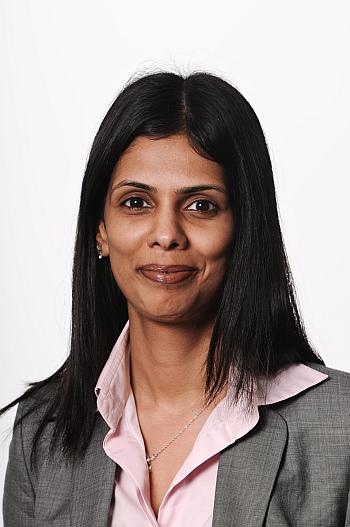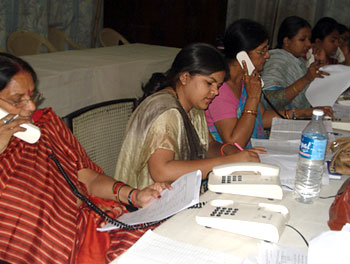 | « Back to article | Print this article |
'I don't know why all women in India don't work'
Shweta Jalan, the recently appointed director of Advent India PE Advisors Private Limited can go on extolling the virtues of the joint family system followed in India. For it helps working professionals like her maintain a perfect work-life balance.
"We have such a good support system where we know our child will be well taken care of," says Shweta about her in-laws and parents are always at hand for her young daughter.
Being a woman and that too working for as niche an area as private equity and to emerge as one of the leading luminaries in the field sure requires a dollop of family support.
While working with ICICI Venture -- and she worked diligently for almost a decade there -- she along with her colleagues played an important role in sewing up deals with Tata Infomedia (now Infomedia18), ACE Refractories and VA Tech India Private Limited thereby establishing herself in the realm of private equity.
Shweta, who began her career at Ernst & Young after completing her MBA from the National Institute of Management, Calcutta, joined ICICI Bank in their e-commerce team and was later shifted to ICICI Venture in 2000. After being a "part of a great environment and thrilling experience for nine and a half years," she decided to call it a day at ICICI Venture and joined Advent as part of a "career move".
In her mid-30s, Shweta who is married and has a daughter, talks to rediff.com about, her career, life at ICICI Venture, challenges that she will be facing in her latest assignment, tips for young grads wanting to make a career in private equity firms, her success mantras and managing work-life balance.
How did ICICI Venture happen to you? Why did you leave E&Y?
I had heard about the e-commerce initiative started by ICICI Bank and, like everybody else at that time, in that age, was excited to be a part of e-commerce, Internet, investment banking and early stage technology companies. I also thought I want to do that.
Somebody put me in touch with Renuka (Renuka Ramnathan headed ICICI Venture till recently but has now quit to reportedly start her own private equity fund). Later I met with her and other senior guys at ICICI and it was done.
'A good investor always makes good money'
Your experience during the nine-year stint at ICICI Venture...
Everything I know today I learnt at ICICI Venture. There were two big parts that I worked at in ICICI Venture: one was the entire business of buyouts, which was a very nascent concept in India at that time. It was really interesting to see how the concept of financial investors owning a company worked, working along with companies in whom we had bought stakes (it was really one of the most interesting part of my work). You pretty much sat in the promoter's shoes.
In some cases we had to hire CEOs, we had to change CFOs; we had to look for mergers and acquisitions of companies... it was like pretty much running a company. It was a great combination of being an entrepreneur and an investor.
The thrill finally in all of this effort was when you go and sell a company and make lots of money for your company.
The biggest deal you made...
One was Tata Infomedia, second was Ace Refractories which we had purchased from ACC and the third was VA Tech India, of which we owned a small part.
Why did you leave ICICI Venture?
I had been there for nine and a half years and at some level from growth standpoint or personal learning standpoint -- I think whatever I had to learn from in and around that environment I had learned -- you really had to take a hard look at some point in time at your career and think what you want to do in life next.
Advent offered me that opportunity in terms of being a part of a really globally integrated organisation. So if I am looking at making a deal in any sector like say ceramics, chemicals or graphite or whatever the case may be, you really get a chance to draw on their global experience, which I am already seeing.
So you are not working inside a cocoon. I really wanted to draw from their whole global expertise.
It is like using all your global expertise to make right deals in India. So the shift from ICICI Venture to Advent was very much a career move.
Your ambitions, motivations in life... what drives you?
I just want to be a very good investor, a good investor being one who makes very good profits. I want to do good deals, and make good amount of money for the company, see substantial changes happening in the company under your ownership. There is a real thrill in that. It is a good investor that always makes good amount of money. That's where I get my motivation and drive.
Challenges that you will be facing at Advent India...
Couple of things: From being a part of a big local firm you are suddenly a part of a huge global firm. The investment committee now is going to be sitting somewhere far away from India. In that sense getting to understand their mindset, making them understand your mindset, get them to understand the nuances of doing deals in India is something I have spent a good deal of time thinking about.
The other challenge is finding the right deal for Advent. I think it is a tall task. For instance, how many deals have happened in the last 12-18 months about which I would want to put a hand on my heart and say I want to do that? None, actually!
The real, real task for me is to find the right deal. Finally, that's where the achievement would come from.
'India is a system made for women to work'
Career options for young grads in buyout firms/ private equity business...
For a fresh out of a campus grad it is a bit difficult to make out in a buyout firm. Because people in this industry look out for experience. It's very rare that a fresh graduate gets hired in a buyout firm. However, the only opportunity for fresh grads in a buyout firm is as analysts.
At Advent India we don't have analysts programme; we hire only experienced people. We require some amount of experience before we hire people.
What kind of experience?
At least two to three years of experience from graduates primarily from the investment banking field, consultancy or private equity firms.
Your success mantras...
I guess it is a combination of positive attitude and a drive to excel. And at the same time you have to very balanced view towards deal making. In PE you have to be very balanced in your approach and not get carried away. If you start doing wrong deals you are dead in your career.
Tips for young grads aspiring to make careers in buyout firms...
To be successful in a buyout firm you have to exhibit a lot of maturity and patience. I think patience is the biggest virtue you need to have in private equity. You can't be in a hurry to do anything. You have to wait to find a right deal; you have to wait for a company to reach from point A to point B or wherever you want it to be so that you are sure it is ready for sale.
When you are young you don't have too much patience and then you do tend to get edgy. You wait for more than two years and still not make any meaningful deals and at times you tend to get jumpy as frustration wears in. Then you think about quitting out of PE as a career option. But then that's not the right way.
Building consistent track record holds you in very good stead in the long run. It held me in very good stead as well. At ICICI ventures I went through thick and thin; we saw very bad times and very good times.
Managing work and family...
Managing work and family is tough at times but in India you have a great support system. I have my parents living in Mumbai and if they are tied up my in-laws take care of my daughter. We have such a good support system where we know our child will be well taken care of. However, you have to make sacrifices at time; it is not as easy as one makes it sound. India is a system made for women to work. I don't know why all the women in India don't work.
Honestly, where else in the world do you have this kind of a support?


